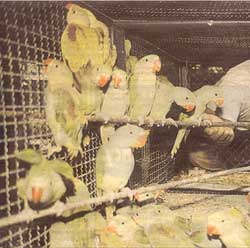 |
Toby Ninan retired from Delhi Zoo about two years back. With his varied experiences with the wild animals in the zoo, he is the right person
to direct your queries to. Hear what Ninan has to say about his life and chosen career! |
 The demand for birds as pets in the west fuels an illegal trade in the wild birds here in India and ever so often we at the Delhi Zoo would be playing host to large numbers of birds caught by customs and
the wild life department at the airport. This is not necessarily a one way traffic. Not too rarely, we do get birds meant for homes of the very very rich especially richly coloured parrots and parakeets.
The demand for birds as pets in the west fuels an illegal trade in the wild birds here in India and ever so often we at the Delhi Zoo would be playing host to large numbers of birds caught by customs and
the wild life department at the airport. This is not necessarily a one way traffic. Not too rarely, we do get birds meant for homes of the very very rich especially richly coloured parrots and parakeets.
The birds going out of the country are always sent in very small containers to save on freight and also to maximize the numbers being sent at one go ( ergo increasing profit margins! ) So much so there is usually a mortality margin of about
20% at the receiving end but since the birds are acquired at a very small cost the mortality does not matter to the traders. The "kabootarwallahs" or birdcatchers are people living at the lowest end of society mostly tribals well versed with the forest. They
are paid so very little that too as and when the dealer feels like paying them. These bird catchers are more often given some rice or other cereals which is of the lowest quality. The bird catchers live in constant fear of being caught by forest officials
and other law enforcement officials who would be usually more interested in getting bribes rather than enforcing the law. Their work is skilled and very hard as they have to be at it for long hours.
Among the worst sufferers in the captive population are the munias as these not only suffer greatly due to being cramped up in very small cages but also are coloured by cheap dyes so as to enhance their saleability. After a couple of washes
the red coloured munia may turn out to be a house sparrow! More often these birds die soon and the process of capturing, and caging is repeated.
When most birds are captured they would be kept in pretty big baskets but soon they are shifted to very small cramped cages to await their long flight usually abroad. If the consignments get caught at the airport they end up in holding enclosures
which are quite large as it would be cruelty to keep them in small crates for any period of time. This however leads to birds being released from small cages flying around wildly and thus expending a lot of energy- often too much energy and excitement result
in large number of deaths at this stage!
Birds being kept in large numbers have to be closely monitored to see that all are feeding and being watered adequately so that the slightest drop in care could also result in many losses. When faced with a captured consignment of small birds,
it turns out to be a challenge and a heart break to zoo managers who have so many other jobs to attend to.
There is however a good side and a large number of birds like the hill mynah could be used to exchange for other birds which zoos may posses or when exotic birds coming into the country are confiscated –these could be used as breeding stock
to increase the variety at the zoo. Again all this entails a lot of hard and dedicated long hours of hard work. Heating or cooling and special conditions of weather have to be created along with the provision of special foods and vitamins and trace element
supplements.
As most of the time these are sent out on the sly there could be even carriers of diseases with which the whole process would become very much complicated and some times result in a complete wipe off.of the birds
Social and family jobs are neglected and nocturnal outings to look after these “guests” become the order of the day. It however increases the watchfulness of the security staff as they have to be more aware of the “ sahibs “on frequent night prowls and have
to forget catnaps of the night.
The heartbreak comes when the birds die in large numbers despite our best efforts!
( Picture of parakeets seized from an illegal trader, by Shailesh Mule of Mid-Day News paper)